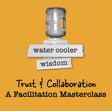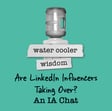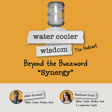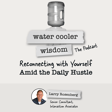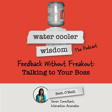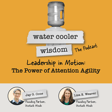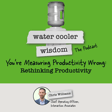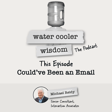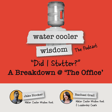Become a Creator today!Start creating today - Share your story with the world!
Start for free
00:00:00
00:00:01

The Productivity Myth of the Return to the Office
In the first episode of Water Cooler Wisdom, we’ll explore the compelling debate about returning to the office and its effect on productivity. Joining us is Rachael Grail, a senior collaboration consultant & leadership coach (and soon-to-be co-host), to dissect the myth that productivity thrives only within office walls.
From remote work revelations to the changing dynamics of office culture, we tackle the big question: Is the office essential for collaboration, or can we be just as efficient from our digital domains?
Editor’s Note: While we mention Rachael as a “guest” in the episode, she’ll become a full-time co-host starting on episode 3. (Yayyy!)
Transcript
Return to Office: Productivity & Collaboration
00:00:10
Speaker
The one time, it seemed the office was dead and the remote work was here to stay. But now, leaders are forcing their employees back to the office in the name of productivity and collaboration. I'm Jake Blocker, and on today's episode of Water Cooler Wisdom, I'm joined by collaborative consultant and leadership coach Rachel Grail. And we'll be diving into this productivity myth of returning to the office. Rachel will share her insights on how it can thrive in today's evolving work environment.
Water Cooler Conversations: Workplace Challenges
00:00:40
Speaker
Let's debunk myths and discover strategies for a happier and more productive workplace. Hello and welcome to the very first episode of water cooler wisdom. I'm your host. I am Jake Blocker and I am thrilled to kick this off. Now, before we get started on today's episode, I should first tell you about what this podcast actually is. So in this podcast, we're embracing that spirit of those impromptu water cooler chats.
00:01:09
Speaker
But since we're in the digital world, you may think of it more as the virtual break room, where insights and stories are shared across cities, across time zones, and maybe even some continents. So I'm going to be your host. And my goal for this is to represent you in these conversations. I want to learn alongside you, and I want to get to the heart of these workplace challenges and how to overcome them.
00:01:31
Speaker
And so my goal for all of this is to pull insights and tips that will help you and maybe even myself as I learn right along with you to make our work life just a little bit easier. At the very least, my goal is to make sure you feel heard and what you're facing in the workplace.
Jake's Marketing & Leadership Journey
00:01:46
Speaker
So I'll give you a little brief about me and then I'll move it over to our amazing guest. So I'm a marketing director at Interaction Associates, and I have been living that office life for not going on 15 years, I think.
00:02:00
Speaker
I've worked in large organizations. I've worked in small organizations. I've worked for myself. I've worked in just about every type of environment, be it cubicles, be it the dreaded open office space, or be it today's topic around remote work. So I'm also a manager. And so I'm always looking for great leadership tips and tricks.
00:02:22
Speaker
as well as advice on how to make my team's life easier, but also myself. Always looking out for number one on that. So that's enough about me. And let me pass this over to our great, great guest today, Rachel Grail.
Rachel's Remote Work Preference vs. Office Trends
00:02:37
Speaker
Thank you for joining us today. Hey, Jake, I'm so happy to be here. I love that intro. Good, good. Well, I am very excited about today's topic. It is something that I'm quite passionate about.
00:02:49
Speaker
As I mentioned, I love the remote life that has been where I spent a majority of my career now. And I couldn't imagine any other way. But we're going to get to the heart of this issue and that return to office that so many people are facing right now.
00:03:05
Speaker
Let me give you a little teeny tiny history and then we'll get right into it. The office was a necessity for a long time. Before we had the World Wide Web in our pocket or even our watch, the only way to communicate with people was to go to the office and meet with them and chat with them and annoy them at their desk.
00:03:27
Speaker
But then flash forward to the internet days and us being available way too easily. It's become less of a necessity. And we saw that so much in 2020 when we were all forced, all office workers were forced to be in a remote setting. And we have leaders who are just shouting from the rooftops, this is amazing, we love it. This is the future, the office is dead. And then those same leaders a couple of years later are saying, no, get back to the office.
00:03:54
Speaker
We need to collaborate. We need to be productive. We must be in the office. But yeah, that's not love us much anymore. So it's
Rachel's Expertise in Leadership & Collaboration
00:04:03
Speaker
causing a lot of issues. And while there are many factors that go into this return office,
00:04:09
Speaker
Commercial real estate, the cheap way to fire people slash lay them off to get them back to the office, quote unquote. So yeah, but today we're going to dive into just the productivity and collaboration side. Do we need to be an office to be collaborative?
00:04:28
Speaker
I'm really excited to welcome the first guest of the first episode, Rachel Grell, who is a senior collaboration consultant with Interaction Associates. Welcome, Rachel. Please introduce yourself and tell us all about those credentials that you have.
00:04:43
Speaker
All right. Thanks, Jake. I am so honored to be the first guest. I mean, yes, what an exciting thing. So yeah, I am, as Jake said, a senior collaboration consultant with Interaction Associates, which means that I get to benefit really from this huge ecosystem of collaborative and leadership tools that we have that we've been refining and
00:05:05
Speaker
using and seeing the power of in practice for over 50 years now. So that's been amazing. Beyond that, I've been in the leadership development space for a number of years now. So as as one does in my line of work, I've been just gathering certifications and trainings because I love to learn.
Remote Work Benefits & Myths
00:05:26
Speaker
Really, the core theme is how people work together, how we understand our default preferences and modes
00:05:35
Speaker
So I have all kinds of certifications about that, leadership styles, organizational mindfulness, conflict modes, women in leadership, communication, on and on really. But primarily a big part of my experience is through one-on-one coaching of leaders and executives. So I'm a professionally certified coach with the International Coaching Federation and was trained and certified at CTI, which is the Coactive Trading Institute.
00:06:05
Speaker
So my work there is primarily lately in global tech companies, but I've worked in all different kinds of industries, public sector utilities, nonprofit organizations, education, lots of different places where people are trying to work together. Interestingly, the themes are often very similar. So I think we can have a, we'll have a lot to say on this topic. I think this is a really juicy and pertinent one. So I'm glad to be here.
00:06:34
Speaker
Yes. Yeah. About that topic. It is, we're going to talk all about that return to the office or forced return to the office as some may feel right now.
00:06:46
Speaker
Yeah, so let me do a little background on remotes slash return slash all the above. In office working was a necessity for pre-internet days. It was the only way you can really communicate and collaborate with your coworkers and your team. And then flash forward to being way, way too available at just literally your watch you can be communicated with.
00:07:13
Speaker
our little leash everywhere we go. Yes, literally yes. And cannot turn it off no matter how much we try.
00:07:21
Speaker
So when we were all thrust into working remote during that COVID era, there were leaders who were just shouting from the rooftops, this is the best thing ever. The office is dead. We're never going back. And the employees were worshiping of yes, yes, yes, yes. Yeah. Well, there was this like, oh my gosh, we can actually do this and not lose productivity. Exactly. I was surprised and delighted. And it was like, this is the future.
00:07:45
Speaker
Work-life balance was in check for the most part, you know, minus some screaming kids in the backgrounds, but we got used to it. Right. Depending on who you are. Exactly. One caveat I want to say about this is that this is probably obvious, but we're not talking about every job. We know there are a number of jobs that for a variety of reasons you need to be physically there for every day. But we are talking about those jobs that are kind of digitally based that have
00:08:13
Speaker
the option to work remotely. For sure, for sure, yeah. Yes, all about that office life. As much as we love hate it, it's our life. But yeah, in recent years, those same leaders who were loving it and saying the office is dead have now flipped the switch and said, that's no way to work. So you must be back to the office. And they do this in the name of productivity and collaboration.
00:08:41
Speaker
But let me give a little editor's note here that there's bigger reasons at play here. There's commercial real estate investments. There are large overheads. There are office spaces that were purchased and just collecting dust. There are also companies facing layoffs who are looking for a route of not laying people off by forcing them back to the office. And there's no quicker way to lose people who don't live anywhere near an office who are forced back to an office.
00:09:10
Speaker
or who also have life circumstances where they can't just change again as well. Yeah, it's something maybe you weren't used to putting your kid in daycare and spending another mortgage on it and now you have to. It's not good for everyone.
00:09:27
Speaker
So, but what we're going to focus on today is that collaboration and productivity piece. And do you really need to be the office for that? What's that underlying issue that's causing that dip in productivity or that lack of collaboration? So yeah, that's a topic for today. And Rachel, off the bat, what are your thoughts when you hear all of this stuff going on?
00:09:51
Speaker
Oh, you know me, Jake, I have so many thoughts and opinions. And I do one more caveat. I'll just say, take whatever I say with a grain of salt. Take whatever Jake says with a grain of salt, although I think he's very smart. But, you know, we're not the arbiters of truth. So try it on, see what you think. Hopefully I'll have some tools or we'll have some ideas to share. But if you don't like them or you disagree, you know, Kevin, let's have a conversation about it. So we're not, we're just sharing
00:10:19
Speaker
what we think, but as my mom would say at mealtime, take what you like and leave the rest. That's my caveat to start.
00:10:28
Speaker
I feel like that's the case for this entire podcast. Since this is our first episode, I should mention that whatever any guests ever says, take it, leave it, do what you want with it and we'll move on. You get a lot at the water cooler. Some of it might be useful, some of it might not. So you get to decide. Exactly. Exactly. What I think is like you said, there was this
00:10:54
Speaker
Obviously, this quick pivot to remote work and this, oh my gosh, we can kind of do this and okay. Wow, yeah, this is the future. And I think the truth is we...
00:11:06
Speaker
There were some things that were sacrificed during that time in terms of collaboration, relationship building, I think especially for junior folks who were just getting into the workforce. They lost a lot about how to be, what's the etiquette, how do I develop relationships, find mentors, things like that. So there were some
00:11:27
Speaker
important elements that I think were lost and sacrificed. But now, just going back to the way that it was is, I don't think, the answer. Yeah, that knee-jerk reaction doesn't seem to be working.
00:11:43
Speaker
No, it doesn't seem to be working because what we have now is people saying, okay, we want you back in the office to collaborate. So then everybody puts on hard pants and they go into the office, they sit in traffic and then they end up in a zoom cubicle on their own feeling like, what am I doing? I could have done this in my chill pants at home. Yep. Yeah. I mean, good luck finding those pants. Oh man. I remember having to go somewhere after working remote for so long and also being in quarantine.
00:12:13
Speaker
You realize some things don't fit anymore. So it's a whole other thing. And just like the pants don't fit, I think also some of the
00:12:22
Speaker
the idea that us as employees will bear the brunt of every discomfort, that also doesn't fit anymore. We can do
Effective Collaboration Beyond Office Walls
00:12:32
Speaker
the work. We can make things happen. I think people really want to collaborate. People are reasonable. They want to contribute to their workplaces, but they don't want to be
00:12:46
Speaker
the take on everything just so that people can have a greater level of control and visibility. I feel like that control is the biggest theme of the returned office. Outside of the other factors we talked about, the control is, I don't see you working, so how do I know you're actually working? Which is disgusting.
00:13:09
Speaker
Yeah, you know, I don't want to vilify leaders because I work with a lot of them. And what I find is they're very, you know, they're very well intentioned that the leaders care for their team. They want to do right by them. They're kind of between the rock and the hard place, navigating the ever changing return to office, kind of things that are coming down from the C-suite. They're trying to make it work.
00:13:37
Speaker
I think in a lot of ways, people really believe that it would be easier if we were all together. And the truth is some things are better together, but not everything. And that's sort of, I think the big idea here is that going back to the office isn't a cure-all.
00:13:57
Speaker
Mm hmm. No, that's that's that was exactly my first question is, you know, what are what are they getting right about this? What what's when is it a good thing to be in the office versus remote? There's lots of things that I think are better when we're together. Obviously, the big one collaborative work when we're brainstorming or problem solving and we can like kind of feed off everybody's energy and ideas. So that's one.
00:14:21
Speaker
of what I mentioned onboarding, especially when you've got a lot of junior folks who are just entering the workforce. They could really build community, find people that they relate to and can learn from. Strategic or nuanced meetings where there's maybe some conflict resolution.
00:14:38
Speaker
times when body language becomes a really important source of information, when you're trying to reconcile differences and build agreements between people, and also just company culture building. There are some times where you want people to have organic and hopefully fun interactions, but I will say there's a caveat to that, which is that culture is experienced differently by different people.
00:15:04
Speaker
Again, if what you want is to build company culture, then be really intentional about how you're doing that and think about it from multiple perspectives. That makes total sense to me. I especially love the shout out to the body language. I'm going to give a little side shout out to my remote worker people of cameras during meetings as much as we may hate them. Oh my gosh, so important.
00:15:28
Speaker
Yeah, they are so so very important. I have friends who will talk about I never do a never on zoom or I'm never on video, we just talk to one another and I don't my brain can't comprehend that. It just seems I am someone who must read body language to understand what's going on. And I can't get that when I'm just talking to people on the phone and I cannot build any connections. So just want to give a little special shout out to my cameras.
00:15:56
Speaker
I wish I knew the statistic for that. I should know this. There's a huge percentage of the information that we get through communication is nonverbal. It is really important. I think there's a lot that you can get
00:16:12
Speaker
when you're really connected, when you're one on one audio only, I do sometimes coach people that way. And there's a lot you can hear when you're really dialed in. But when you're having a meeting with various people, or you're trying to collaborate in some ways, yeah, it does help to be able to look at them. But you can look at them on screen too. And that's, that's a culture thing. Some companies have a culture and, and there's an inclusivity piece as well. There are some
00:16:39
Speaker
times where not everyone can have their camera on. So I do think it's important to be sensitive to that and not have an expectation that everyone always will have their camera on. But it is a generous thing and an easy way to be more effective in collaboration.
Processes Over Presence in Collaboration
00:16:58
Speaker
Completely agree. Yeah, there are times when I know I've taken some one-on-ones that we don't need to share anything. We've seen each other enough. We've been on Zoom call after Zoom call after Zoom call. Let's just hop on the phone for 15 minutes, chat, and call it a day while I'm walking outside doing something to get away from this blue light for a little bit. Well, I think you're getting at something that I think is a really important point and a big idea, which is
00:17:27
Speaker
prioritize your process over your presence. So think about what it is that you want to do. If you just want to have a quick connection with somebody and you've already been interacting with them a lot, maybe a phone call is absolutely adequate. If you've got something that's more in depth, maybe you want to consider a different process. Whatever it is, we need to be intentional about what's the function and what's the process that's going to get it done in the best way.
00:17:56
Speaker
Absolutely. Absolutely. So let me, let me get us back to this return to office here. Now let me, let's talk about the quote unquote myth that we're calling the quote unquote is the office, the magic, the magic bits. Is that, is that the magic juice or water by the water cooler that people should be drinking? Uh, is that the magic to productivity and collaboration being in the office?
00:18:22
Speaker
Oh my gosh. Well, for anybody that's been in a meeting where there's no clear desired outcome, where there's no clear facilitator, maybe you're all sitting around a table together, but if you haven't thought through about how you're going to do it, this goes back to this process of represents, but you haven't thought it through. You haven't created a process based on what you actually want.
00:18:46
Speaker
It doesn't matter if you're together or if you're
Pandemic-Induced Work Habit Changes
00:18:49
Speaker
apart. It's not going to work as well as it could have you thought it through. Yeah.
00:18:57
Speaker
That totally makes sense to me. I think I just recently got a meeting invite that was just the name of the meeting. I didn't know what to do. I had to ask, what is this actually about? I don't know what to do here. Yeah, I feel like it's not the magic pill. There's much more, there's deeper things at play than where you were physically located. If it was a magic pill, then we would have been
00:19:25
Speaker
living the dream before the pandemic. And I don't think that was the case. I think that in a lot of ways that we have an opportunity to really
00:19:36
Speaker
optimize here. There was that great article that just came out that you sent me. It was from... I think it was Fast Company. Fast Company. Yeah, where it was talking about actually how our brains now have adapted to appreciate the quiet environment now and to be able to work in a more focused manner at home. So I think before, when we were in the office,
00:20:05
Speaker
we might have been more used to it. We were like all the dings and the buzzes and the, you know, back in the day, the fax machines, all of those sounds going on all the time. But people who had a work function that required focused, thoughtful work were just kind of grinning and bearing it. They were getting through it. And now I think we can use the office more intentionally for things that really benefit from being together.
00:20:35
Speaker
and then use quiet spaces more intentionally. For some, home isn't the quiet space. You know, the office is the quiet space. But we have this new set of tools available, this new set of environments available to us. And I think that's really exciting.
Balancing In-Person and Remote Work
00:20:51
Speaker
We could make it even better now.
00:20:55
Speaker
Yeah. Even my team, if you didn't pick up, I love remote working. I don't know if that was obvious or not, but I'm a big fan. But even my team, we like to meet up occasionally, maybe twice a year. It's marketing, so there's creativity going on. There's a lot of brainstorming. There's planning.
00:21:14
Speaker
So, it's super, super helpful just to get in a room for a day, hash out some planning for a quarter. And in that one day, we have so much knocked out that may have taken quite a few sessions on Zoom to do, but we were in the room together. Right. And when you're getting ready to have that time in the room together, I've
00:21:36
Speaker
Pretty confident that you have figured out who are the interested parties that need to be there. How much work can you do independently beforehand?
00:21:45
Speaker
So that when you come together, it's hit the ground running time and it feels really effective. And that's super satisfying for people. What isn't satisfying is when people say, Oh, we've got to get together in the office because that's where collaboration happens. And then you get there and they're like, okay, so what are we doing? And then you start to hash out the front, Oh, well, Oh, we really needed that person here. Or we don't have that information that we need. Now it's kicked the can down the road to another meeting.
00:22:14
Speaker
And boy, there's just no quicker way to erode trust and get people frustrated than not having it together.
Challenges of Open Office Environments
00:22:23
Speaker
And I know that's asking a lot. I'm not just putting it all on managers, but I think it's worth doing. It's worth figuring out how to do that.
00:22:34
Speaker
Yeah. Yeah. I, I, I fear that a lot of leaders may be thinking, okay, yeah, they walked in the office and magically collaboration happens. Tada. This whole time. Look, look at collaboration. Look at it happen. Don't bother everyone at their desk right now and collaborate. Yeah. I love that. I love the piece of being intentional about what you're actually doing and
00:23:00
Speaker
When we do our meetings in person, they're a big investment. We're flying somewhere because we're all over the place. We want to make that time as valuable as possible. Yeah, weeks in advance, I have a full agenda planned out. I have it mapped out what we're going to do, the pre-work that you can do beforehand so we come fully prepared. You'll leave exhausted.
00:23:22
Speaker
you accomplished so much because it was intentional. You feel like, yes, that worked. And now I can go back to my own space, my own four walls, and do my work.
00:23:37
Speaker
Yeah. So it's, uh, I also want on that, on that article, there was a piece on the open office space. I want to also give a little shout out to the tried and true, not really open office space and introverts everywhere. Heart palpitations. Yes. Yeah. Yeah. It's, uh, I, that was my last in-person job was in an open office space and, uh,
00:24:04
Speaker
I can speak for all the other my fellow introverts of how draining, miserable that time was. So I don't miss that. It's not it's not great. Yeah, I mean, there's there's some people love it. They can see what's going on. And it feels really exciting. And again, I think it depends on your function. It depends on your personal preferences. It depends on
00:24:33
Speaker
what your priorities and goals are for the day, for the week. So there's so many factors that go into, is that environment the right environment? For sure. And I do want to speak to that article because there was this idea from the Wall Street Journal that suggests what we need to get back to
00:24:58
Speaker
full fitness of being able to be in the office is just more quote exercise. We need to be around all that noise and we'll just get used to it again. No, no, no.
00:25:09
Speaker
No, no, I mean, I can't maybe this is a crass metaphor. So I want to apologize if there's any sensitivity to alcohol out there. But I can't help but think that it's like, you might say you feel the effects of alcohol less when you build up a tolerance. So just like drink more and you'll be fine. It may be true. But that does not mean that it's good for you. Not at all. Yeah, sure. I can manage it. But
00:25:40
Speaker
To place all the burden on the employees to adapt, to just put up with it is, first of all, it's not optimizing your workforce, and it doesn't think about the function. It doesn't think about all of the tools that we have available, which is people being able to work from home and get so much more done.
00:26:08
Speaker
Yeah, I mean, I think there's, there's certain, like we mentioned, there are certain things that are great to do in person, hash out, do that brainstorming, what have you. And there's that, that, you know what, I'm going to sit and zone out and work and knock things out. The last place I want to be is an open office space where I hear every single conversation around me.
00:26:28
Speaker
and being bothered at all times. I do not want to do that work. And if you're like me, I have my little, like, I have my little sensors out all the time. And I'm like, Oh, what are they talking? Oh, that's really good to what I'm working on. It's like, it's kind of like satellite disks always out. And nothing ends up being done. I read something recently, it said, there was a study, I wish I could remember where it came from.
Adapting to Hybrid Work Models
00:26:54
Speaker
That the in the average day,
00:26:57
Speaker
an employee loses three to five hours of productive time in an open office environment due to distractions and just chatting. I wonder how that feels to people or people out there going like, oh yeah, that feels about right. Or if people are like, no, I'm way more focused than that. If you're more focused than that,
00:27:20
Speaker
I want to know your secret. Yeah. Sometimes just my cat meows at me and I'm distracted. So yeah, it's a challenge. Yeah. Well, uh, let me close this down a little bit and I want to ask another question here for, for those leaders out there that are facing this, you know, maybe they're just told you have to implement this. You have to implement this new hybrid, this new remote, this new, whatever.
00:27:46
Speaker
What's your advice to those middle managers just dealing right now? Yeah, first of all, my heart goes out to you. Shout out to you managers because I know that you're juggling to get work done.
00:28:02
Speaker
and building new processes in this world. You're the intermediary between your teams and these changing messages. So we see you, we know how hard you're working. There's probably three main things I would suggest for you to focus on if you're in that. First is listen to your teams.
00:28:22
Speaker
The second is to try to be flexible based on what you hear, the degree that you have that. And the third is this idea of prioritizing the process over just presence. And I could go into those in more detail if you want.
00:28:38
Speaker
I would love more detail, but unfortunately, I think we have to wrap it up. We're somewhere around time, but I want to dive more into this another time. I think this is a topic that could definitely be continued. And I first want to thank you, Rachel. Any last words to the people? Oh, yeah. Last words. I think my last words would be. We want to move forward and we have these new
00:29:07
Speaker
tools available to us which are the option to
00:29:12
Speaker
work from an environment that optimizes for the function of the job that you're doing that day. So don't be afraid to create a new process based on what people need so that you can get the most out of your team.
Inclusive Work Environments & Team Well-being
00:29:29
Speaker
I think that's the way for people to be effective. That's a way for people to be satisfied. And if we can really be thoughtful about the way that we're working now,
00:29:41
Speaker
I think we have the opportunity to be more inclusive, have greater well-being, have more diversity on our teams in a variety of ways, and that it's a really big opportunity. So let's not be afraid to move forward, even if we don't quite know how to do it yet. Just listen to each other and don't be afraid to experiment to the degree that you're able.
00:30:12
Speaker
Yes. That's great. That's a great thing to leave everyone with. And with that, thank you so much, Rachel. Thank you for joining me. And I know we will have other discussions in the future that I am very excited about. It's been such a pleasure to be here, Jake. Thanks for having me. I love to noodle on stuff with you. Yes, I love it. Well, thank you so much. And thank you to the listeners. And we'll catch you next time. See ya.
00:30:39
Speaker
Thanks for listening to Water Cooler Wisdom. This podcast is brought to you by Interaction Associates, a leading professional development and leadership training organization whose mission is to help people work better together. If you'd like to learn more, visit interactionassociates.com. If you have questions, comments, or are interested in collaborating with this podcast, you can email us at watercoolerwisdom at interactionassociates.com.

